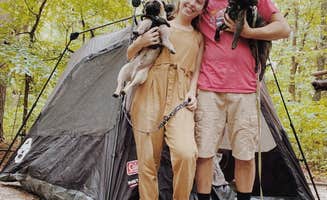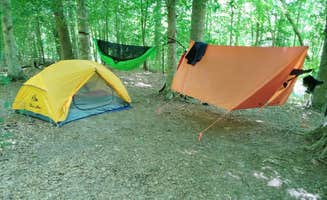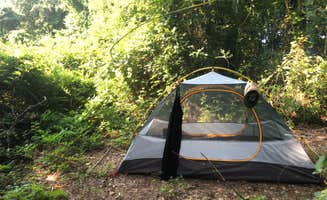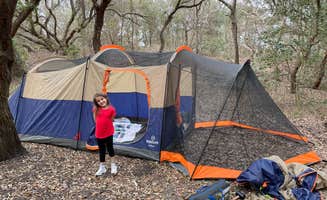Tent campsites near Carrollton, Virginia sit within the Atlantic coastal plain, typically at elevations under 100 feet above sea level. The region features a humid subtropical climate with hot summers and mild winters, making spring and fall the most comfortable camping seasons. Most primitive camping options require some effort to access, with trails ranging from short quarter-mile walks to multi-mile hikes or paddles through diverse wetland ecosystems.
What to do
Paddle rental options: At Merchants Millpond State Park, visitors can rent canoes for self-service access to remote campsites. "Canoes are self service (you have to get them off the rack, get paddles and lifejackets yourself). Put in is easy, and they use a buoy system to help navigate to the canoe-in campsites," explains camper Becky E.
Wildlife viewing: The coastal wetlands and forests offer excellent wildlife spotting opportunities. At Merchants Millpond, "The cypress trees, swamp flora and fauna are amazing. One of my kids caught a gar, we saw a bald eagle's nest, snakes, frogs, turtles, and lily pads everywhere," shares one reviewer.
Beach activities: Tent camping near ocean beaches allows for swimming and fishing. At False Cape State Park, "The saltwater fishing in the area was great. My cousin even caught a few baby sharks," notes Sam M., highlighting the fishing opportunities.
Trail exploration: Many camping areas feature interconnected trail systems. "There are miles of trails around the lake and through the woods you can follow," mentions Brandon W. about Sandy Bottom Nature Park.
What campers like
Remote beach access: The effort required to reach some tent campsites creates uncrowded beach experiences. "Really there wasn't hardly anyone else out there, so it felt like we had our own private beach. We hiked out to our spot, but we saw some people biking into theirs," notes Sam M. about False Cape State Park.
Spectacular sunsets: Coastal locations offer memorable evening views. "The most stunning part was definitely the sunsets. No two looked the same... Nothing better than a beach sunset," explains a False Cape camper.
Privacy between sites: Many tent camping areas provide good separation between campers. At Sandy Bottom Nature Park, sites are "spaced nicely apart with convenient amenities despite the highway noise," according to reviewers. The campground offers 11 primitive tent sites including two group sites.
Protected camping structures: Some sites include practical amenities that enhance the camping experience. The Wisteria Beach Hideaway includes "the bug screen and hammock that are part of the site was so appreciated. Also, having a shower was great - it felt like we were glamping!" reports camper RL.
What you should know
Access challenges: Many of the best tent campsites require significant effort to reach. At Bennetts Creek Canoe In Campground, "It was a 4.5 mile paddle to the site, then roughly 1.5 down to the dock with a staged vehicle," notes todd B.
Insect protection: Bug spray is essential, especially for beach camping. "Due to a lack of wind, flies were bad on the beach. I would recommend bringing an insect screen if you have it," advises Kat H. about Wisteria Beach Hideaway.
Drinking water limitations: Not all camping areas provide drinking water at individual sites. As Mark N. cautions about Bennett's Creek, "The water there does not move therefore is not recommended for filtering for consumption."
Navigation challenges: Some parks have confusing trail systems. At Merchants Millpond, "The kayak/canoe round was not easy to navigate so bring your 3rd party map/GPS. The maps they provide are almost useless because it outlines the terrain but because it's a swamp the terrain changes with the water level," explains Mark N.
Tips for camping with families
Choose accessible sites: For families with young children, consider tent sites with shorter access trails. "We've never camped here but we lived about 5 minutes down the road from the park and absolutely loved it. There are miles of trails around the lake and through the woods you can follow. It is extremely dog friendly with a fenced in dog park as well," says Brandon W. about Sandy Bottom Nature Park.
Bring beach toys: Sand-based tent platforms and nearby beaches make perfect play areas. "There are plenty of sand for kids to play in right at the campsite, and there are very few hazards for small children aside from the ocean itself," notes Stephanie J. at False Cape.
Consider biking with trailers: Some remote beaches can be accessed with children using bike trailers. "My husband and I each hooked a trailer to our bikes, and I towed the kids and he towed our gear. The kids loved riding through Back Bay, and all of us enjoyed having the beach essentially to ourselves," shares Stephanie J.
Plan for adequate water: When camping with children, especially at sites requiring hiking access, water planning is critical. "Bring plenty of water for hike in during summer, hardly any shade hiking in," advises Jesse S. about False Cape State Park Campground.
Tips from RVers
Limited RV options: True RV camping options near Carrollton are minimal, with most sites focusing on tent camping. At Carter's Cove Campground, "More of a long term stay but there are a few spots for RV's Laundry, trash, restrooms, picnic table, fire pit (day use only). Mature trees and over all space is very large. Sites are level with some spacing," reports N I.
Consider alternatives: Instead of traditional RV camping, some families use alternative approaches to access remote beaches. "We brought our 9 month old and 2 year old children. We towed them in a trailer and they loved their time at the beach," explains Tim R. about biking into False Cape State Park.
Plan for primitive conditions: RVers accustomed to hookups should prepare for more rustic experiences. Many campsites are primitive with no electric, water, or sewer hookups available, requiring self-contained operation and careful waste management.





